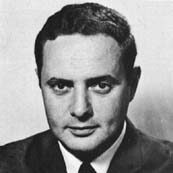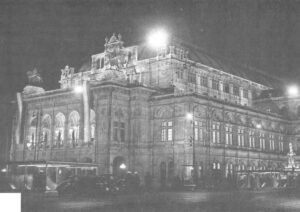Janos Gereben
- 1969

Fellowship Title:
- Social and Political Development in Eastern Europe
Fellowship Year:
- 1969

So Who Needs Karajan?
(Tales of the Vienna Opera)? VIENNA — This was once a great city, the capital of a mighty empire. It was a good city, a cosmopolitan one, freely receiving and warmly embracing people from all over Europe. It was an inspiring city, home to giants of music and literature. And, throughout its greatness, it was always a hard city, cruel to its best, crippling and killing those very men who gave it their work and thus its greatness. It’s all gone now. The greatness, the goodness, the inspiration are not here any more. Vienna Opera House Hardness to the exceptional, the creative, the great — that remained, but, with the diminishing target, the city’s collective cruelty somehow became smaller, pettier, triter, taking forms fitting its new objects — jealousy, hair-splitting, impotent criticism, whining quarrels. Greatness went with the Empire a half a century ago, but leaving behind, to this very day, a gigantic bureaucratic machinery which is now choking the country and the individual with its tentacles of red tape. Goodness, laughter, kindness, gemutlichkeit retreated
Life in Warsaw
A report of uncaptioned pictures from the Polish capital for the purpose of giving an over-all impression of everyday life there. The accompanying text consists of excerpts from Warsaw papers on the lot of the “little people” vs. bureaucracy in a Communist society—with some remarkably candid observations about both the power plays of the New Class and the undaunted boldness of complainers after more than two decades of living in a police state. From Polityka: “Wrongs for Sale” by Andrzej K. Wroblewski— We all know these letters. We know them and fear them. I can well imagine the author, a desperate man, slipping five or six carbons into his typewriter, leaving a space at the top and then writing—page after page—the whole truth about his wrongs. He has abandoned caution, thrown diplomacy to the winds, staked all on a single card. After finishing, he fills the empty space with different addresses: The Central Committee /of the Communist Party/, the State Council, the State Prosecutor, the main council of the trade unions, Trybuna Ludu /the party’s
Oh! Gibraltar!
January, 1970 Lerchengasse 28/43 1080 Wien, Austria GIBRALTAR—For a giant tooth of a rock, embedded in a peninsula just three miles long and less than a mile wide, with 20,000 people and two packs of Barbary apes living on its slopes, this place has been in the news somewhat out of proportion to its size. And the prediction from here is that there is lots more to come. Any day now, for instance, and soon, there will be an announcement about talks between Spain and England concerning the future of the Rock. These talks are going on now, people here suspect, but kept secret because both powers became entangled in their own propaganda and cannot extricate themselves from it in public. Propaganda? Is that the right word to describe the noble cry “British Forever”? Or “Spain for the Spaniards”? Nothing French about that. The name is derived from the Rock’s old tag, Gibel (mount) Tarik, after Tarik ibn Zaid, the Moor who occupied it in A.D. 711. Let a student of East Europe loose
The Secret Revolution
December, 1969 Lerchengasse 28/43,1080 Wien, Austria BUDAPEST—Neosocialism is on the march in Hungary. One is forced to invent an awkward term like that to describe what’s happening in this country. How else can you break the news to the world that Communism (Socialism, in the euphemistic terminology of East Europe) is on its way out here, but nobody knows about it? Neosocialism means Communist slogans and Capitalist machinery, red flags and Coca Cola, the celebration of the Great October Revolution and SRO performances of “Hair.” This whole business cannot even be called news. It’s the greatest non-news item of our age from Hungary and it is astonishing. A nation of 10 million, famous throughout history for its collective big lip and suicidal extremism, has become a Neosocialist country, united by modesty, moderation, and success. And 10 million people, together, keep all this a secret. After the failure of all the anti-Soviet uprisings in East Europe—East Germany, 1954; Poland and Hungary, 1956; Czechoslovakia, 1968—Hungary today is in the midst of a silent, secret, and successful revolution.
Salt and Pepper or The Untold Story of the Strategic Arms Limitation Talks
Nov., 1969 Lerchengasse 28/43 1080 Wien, Austria HELSINKI—Finland is a neutral country. The first proof of that could be seen right at the airport. Coming through the dense fog permanently eveloping the Finnish capital during its 5-month-long winter, one feels the unexpectedly perfect touchdown of the other-wise quite lousy DC-9 (Caravelles, even Tupoliev 134s, are much better) after endless minutes of not seeing the tip of the wing, much less the airport lights. Breathing deep sighs of relief (Scandinavian flying is strictly for Rudolph & Co.), the traveler is greeted by the spectacular hostesses of the SALT Press Center and there, on their desk, is the proof positive of Finnish neutrality. By way of vital information about the city, an illustrated flyer announces: “Novembertime in Gay Old Fennia. Lunchtime buffet groaning (sic) with all kinds of original Finnish delicacies… “The French M sex-bomb Muriel Ashford dances naked (!) first at eleven at night…” What’s neutral about that? Well, on the flip side, the whole message is repeated in RUSSIAN (see proof on the
